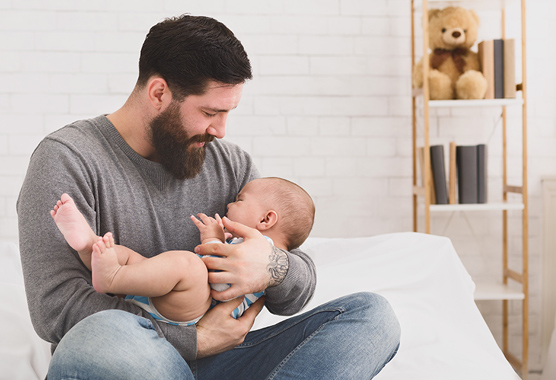Whooping Cough (Pertussis)
Whooping cough is a highly contagious illness that is especially dangerous for infants and young children. The pertussis vaccine helps to prevent disease. Our infectious disease experts provide fast treatments if you or your child get sick.
Medically reviewed by Natasha Nakra, M.D. on Aug. 25, 2023.

Specialized Care for You and Your Family
The pertussis vaccine can protect you and your family, but vaccines aren’t perfect.
If you or your child gets whooping cough, we can help. At UC Davis Health, your family benefits from a team of pediatric infectious disease specialists and internal medicine doctors who specialize in adult infectious diseases. We provide advanced care for whooping cough to aid recovery and prevent complications.
What Is Whooping Cough (Pertussis)?
Whooping cough is a contagious bacterial infection that causes severe coughing fits. It’s sometimes called the 100-day cough because the coughing fits can last for months. The illness is especially dangerous for infants and young children, who often need hospitalized care. Teens and adults can get whooping cough, too.
The medical term for whooping cough – pertussis – means violent cough. The more common term – whooping cough – refers to the “whoop” sound you make when you inhale to catch your breath during a coughing fit.
The pertussis vaccine can protect you and your family. Children 6 and younger need five doses of the diphtheria-pertussis-tetanus (DTaP) vaccine. People 7 and older who didn’t get the DTaP vaccine may need one or more doses of the tetanus-diphtheria-pertussis (Tdap) vaccine.
Whooping Cough Symptoms
Early signs of whooping cough typically appear 5 to 10 days after exposure, but they may develop as late as three weeks later. These stage 1 symptoms mimic a cold and last for about two weeks.
The coughing fits, whooping sound and other stage 2 (late) symptoms happen next. These symptoms may last from 1 to 10 weeks. Symptoms are worse in the beginning and gradually improve over time.
Teens and adults, as well as vaccinated people of all ages, tend to have milder symptoms.
Common Early (Stage 1) Symptoms
Signs of early (stage 1) whooping cough include:
- Low-grade fever of 100.4°F or lower
- Mild cough (in anyone except infants, who may not cough)
- Pauses in breathing (apnea) in infants and young children that cause their skin to turn blue or purple (cyanosis)
Common Late (Stage 2) Symptoms
Late (stage 2) whooping cough symptoms include:
- Rapid, violent, uncontrolled coughing fits (paroxysms)
- High-pitched “whoop” sound at the end of a coughing fit
- Vomiting during or after a coughing fit
- Difficulty breathing
- Extreme fatigue after a coughing fit
Causes and Risk Factors for Whooping Cough
A bacteria called Bordetella pertussis causes whooping cough. The infection spreads from person to person in respiratory droplets and saliva. You can get whooping cough if an infected person coughs or sneezes and you breathe in the bacteria. You can also get it if an infected person kisses you.
People who don’t get the pertussis vaccine, or who haven’t received all their vaccine doses, are most at risk. Other factors that increase risk include:
Age
Children 6 and younger who haven’t received all five vaccinations are more at risk. The risk is highest for newborns, who don’t get the first vaccine dose until they’re 2 months old.
Breathing (Respiratory) Issues
A history of breathing disorders, such as pneumonia or asthma, increases your risk.
Pregnancy
Women in their last trimester (third trimester) of pregnancy are more prone to whooping cough.
Diagnosing Whooping Cough
Our providers may diagnose whooping cough based on your symptoms and known exposures to people who have the illness.
You may also undergo tests to check for the bacteria, including:
- Mucus test: Your provider uses a cotton swab or syringe with saline to collect a mucus sample from the back of your throat. A lab tests the sample for the presence of the bacteria.
- Blood tests: Blood tests can help with diagnosis.
Whooping Cough Treatments at UC Davis Health
At UC Davis Health, our infectious disease specialists start immediate treatments to minimize your risk of serious breathing problems. We can also recommend home treatments to ease the cough and help you breathe better.
Antibiotics
Antibiotics kill the bacteria that cause whooping cough. They also shorten the time that you are contagious. Taking antibiotics when early symptoms appear makes the coughing fits in the second stage less severe. Infants and those with severe breathing problems may need IV antibiotics in the hospital.
Cough Relief
Antibiotics don’t stop or treat coughs. Cough medications also don’t work on whooping cough. You may need to suction mucus from your infant or young child’s nose. You should also drink liquids to prevent dehydration and use a cool mist humidifier to loosen mucus.
Preventing Whooping Cough
The pertussis vaccine is the best way to protect your family from getting whooping cough. How many doses you need, and when to get them, depends on your age and other factors.
DTaP Vaccine
Children 6 and younger need five doses of the DTaP vaccine starting at two months and ending at age 6.
Tdap Vaccine for Children
Children 7 to 10 years who didn’t receive the DTaP vaccine should get one dose of Tdap.
Tdap Vaccine for Adults
Adults need a Tdap booster vaccine every 10 years.
Tdap Vaccine During Pregnancy
Pregnant people should get a single Tdap vaccine at the start of the third trimester. This vaccine provides some protection for the baby after they’re born.
Preventive Antibiotics
If you’re exposed to the pertussis bacteria, antibiotics can lower your risk of getting sick. Our doctors may prescribe these drugs for those at high risk of complications, such as infants, pregnant people and those with known breathing problems.
Proper Hygiene
The same steps you take to prevent colds can also lower your risk of pertussis. Wash your hands, use hand sanitizer and cover your mouth and nose when you cough or sneeze.
Who does it affect?
24MPeople worldwide get whooping cough every year
Who’s most at risk?
3 in 4Cases occur in children younger than 5 years old
Annual worldwide deaths
160KPeople die from whooping cough every year
Source: National Library of Medicine: Pertussis
Request an Appointment
As Sacramento's No. 1 hospital, you'll benefit from unique advantages in primary care and specialty care. This includes prevention, diagnosis and treatment options from experts in 150 specialties.
Referring Physicians
To refer a patient, submit an electronic referral form or call.
800-4-UCDAVIS
Patients
Call to make an appointment.
Consumer Resource Center
800-2-UCDAVIS

Ranked among the nation’s best hospitals
A U.S. News & World Report best hospital in cardiology, heart & vascular surgery, diabetes & endocrinology, ENT, geriatrics, neurology & neurosurgery, and pulmonology & lung surgery.

Ranked among the nation’s best children’s hospitals
U.S. News & World Report ranked UC Davis Children’s Hospital among the best in pediatric nephrology, orthopedics*, and pulmonology & lung surgery. (*Together with Shriners Children’s Northern California)

Ranked Sacramento’s #1 hospital
Ranked Sacramento’s #1 hospital by U.S. News, and high-performing in aortic valve surgery, back surgery (spinal fusion), COPD, colon cancer surgery, diabetes, gynecological cancer surgery, heart arrhythmia, heart failure, kidney failure, leukemia, lymphoma & myeloma, lung cancer surgery, pacemaker implantation, pneumonia, prostate cancer surgery, stroke, TAVR, cancer, orthopedics, gastroenterology & GI surgery, and urology.

The nation’s highest nursing honor
UC Davis Medical Center has received Magnet® recognition, the nation’s highest honor for nursing excellence.

World-class cancer care
One of ~59 U.S. cancer centers designated “comprehensive” by the National Cancer Institute.

A leader in health care equality
For the 13th consecutive year, UC Davis Medical Center has been recognized as an LGBTQ+ Healthcare Equality Leader by the educational arm of America’s largest civil rights organization.

